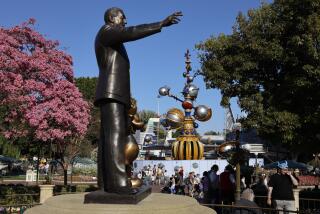It May Look Like a Melting Pot, but It’s Gold-Plated
When you walk through Los Angeles City Hall, it looks like a diversity enthusiast’s wildest dreams come true.
Blacks, browns and whites together, sharing work on city commissions, in council offices. Even the lobbyists are multiethnic. Perfect for a city that has become one of the world’s great conglomerations of races and cultures.
But the world does not live by race alone.
Just as important is economic class--differences between the affluent and well-connected and the less fortunate and unconnected. This cloutless majority extends from the middle class downward to the poor.
As far as they are concerned, there could be a big sign posted at City Hall: Don’t Bother Asking for Help Here.
For today’s Los Angeles government is run by a privileged few--big businesses represented by powerful lobbyists; wealthy individual campaign contributors; municipal employee unions, and homeowner groups opposed to any improvement they fear will threaten their property values.
*
That point is made in an excellent new book, “Rethinking Los Angeles,” a collection of essays and studies edited by USC professors Michael J. Dear, H. Eric Schockman and Greg Hise.
In one essay, Schockman takes a probing look at the diversity on city boards and commissions and shows it to be a sham. The board members and commissioners are appointed by Mayor Richard Riordan and confirmed by the council. They determine the policy agendas of such powerful agencies as the Police Department, Recreation and Parks, Fire, Airports, Harbor, Library, and Water and Power.
Schockman found that on the surface, the commissioners are a diverse group, racially. A total of 14.6% are African American, 18.4% Latino and 8.9% Asian American.
But using a new computer mapping program at USC, researchers probed beneath the surface and found that the so-called diversity masked a disconcerting sameness: The commissioners, no matter what their races, pretty much lived in affluent areas.
Analyzing street addresses, the USC computer mappers traced the commissioners to upscale areas of Westside Los Angeles and the San Fernando Valley.
Schockman said the study showed “the apparent redlining of city commission appointments from the inner city and South-Central and East Los Angeles.” There was, he wrote, “a literal exclusionary ring around the poorer, inner-city communities from which no commissioners have been drawn.”
By and large, he said, commissioners “come from relatively affluent income areas and probably bring with them in their public decision-making roles an inherent class bias and prejudice as they determine public policies that affect all Angelenos.”
The freezing out of the unprivileged extends beyond the commissioners.
There’s a multiethnic lobbying corps at City Hall, divided between men and women. What most of them have in common are connections, an ability to get appointments with council members and key staffers. The same is true of employee union leaders, who represent a largely working-class constituency but, because of the very nature of their jobs, are part of City Hall’s elite, insider political culture.
*
This huge gap between the elite and the outsiders is at the heart of the current controversy over revising the City Charter.
Mayor Riordan and the City Council are on opposite sides of the battle. But neither side is rolling out the welcome mat to the disenfranchised.
It was Riordan, after all, who reached into the hot tubs of upper-class L.A. for his city commissioners.
He wants a new City Charter to give a future mayor more power. But there’s no assurance that it won’t be used to continue the present elitist system.
The council members aren’t much better. They confirm the commissioners. And with their ironclad grip on zoning and other permits needed by business and homeowners, they have formed community organizations filled with loyalists. Even in poor areas, these loyalists make up another kind of elite that receives access in exchange for supporting their council member’s actions in City Hall.
As you watch Riordan and the City Council slug it out over the charter, don’t lose sight of the more important issue: opening up City Hall to those now shut out.
More to Read
Sign up for Essential California
The most important California stories and recommendations in your inbox every morning.
You may occasionally receive promotional content from the Los Angeles Times.










